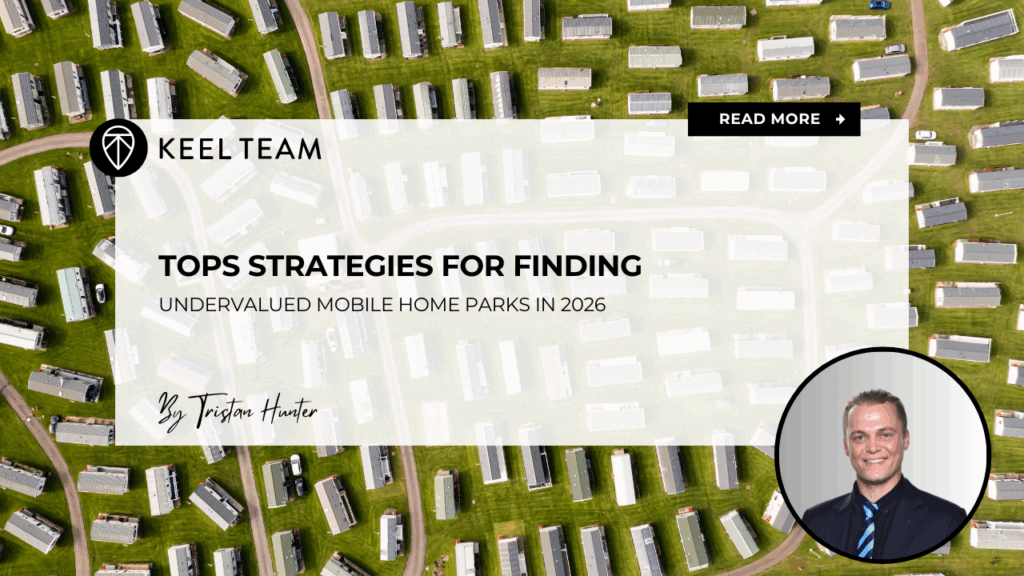Top Strategies for Finding Undervalued Mobile Home Parks in 2026
-
 Tristan Hunter - Investor Relations
Tristan Hunter - Investor Relations

Investors often seek opportunities in real estate that offer potential for growth and stability. Mobile home parks may present such options, especially as demand for affordable housing continues to rise. In 2026, economic factors like moderate interest rates and population shifts could influence the market. This article explores strategies that might help you identify undervalued mobile home parks. Keep in mind that no approach guarantees success, and thorough research remains essential. By focusing on data-driven methods and networking, you could uncover properties with room for improvement.
Understanding What Makes an Undervalued Mobile Home Park
Before diving into search tactics, let’s grasp the concept of undervaluation. An undervalued mobile home park typically shows signs of underperformance but holds potential for enhancement. For instance, properties with deferred maintenance, low occupancy rates, or inefficient management often fall into this category. Investors look for properties where current owners, such as retiring mom-and-pop operators, have not maximized revenue. These situations might allow for rent adjustments or operational tweaks to boost cash flow potential.
Additionally, location plays a key role. Mobile home parks in growing areas with job opportunities and population increases could appreciate over time. However, avoid regions prone to natural disasters, as they might increase risks. In 2026, trends suggest stability in housing markets, with prices rising slowly. This environment could favor buyers who spot properties trading below market value based on comparable sales.
Download our FREE eBook on the Top 20 things to know BEFORE investing in mobile home parks!
Key Indicators of an Undervalued Mobile Home Park
Check for cap rates around 10 percent or higher, which might signal better returns compared to other investments. Also, examine utility setups and the average age of homes. Older mobile home parks with value-add potential, like those needing upgrades, often provide entry points. However, always verify these factors through inspections.
Tips for Effective Online Searches
Narrow queries to include keywords like “undervalued mobile home parks” or “value-add opportunities.” Review historical data on sites to track price trends. However, supplement online findings with on-site visits, as listings might not capture all details.
Pursuing Off-Market Opportunities
Many undervalued mobile home parks never hit public listings. Owners might not actively sell but could consider offers. One method involves direct mail campaigns. Craft personalized letters to mobile home park owners, expressing interest and highlighting benefits of selling to you. Since mobile home parks are limited in number, a small campaign might yield results.
Another approach is “driving for dollars.” Cruise through areas with mobile home parks, note addresses, and use tax records to find owners. Then, reach out via phone or mail. This hands-on tactic requires effort but often uncovers hidden gems with less competition.
Furthermore, cold calling remains effective. Contact owners directly to discuss potential sales. In 2026, with retiring baby boomers owning many mobile home parks, this strategy could tap into motivated sellers looking to exit.
We make over 260,000 cold calls per year and it is still our number 1 strategy for sourcing off-market deals.
Networking in the Industry
Connections open doors to deals. Join communities like the Mobile Home Park Investors group on LinkedIn or forums on Mobile Home University. These platforms allow sharing experiences and learning from peers. Attend conferences or webinars on mobile home park investing to meet brokers and owners.
Podcasts, such as the Passive Mobile Home Park Investing Podcast, provide insights and potential leads. Engage with experts who discuss future market trends, including the push for affordable housing amid economic stability.
Work with commercial real estate agents specializing in mobile home parks. They often know of upcoming sales before listings go live. Build relationships by attending local meetups or industry events.
Expanding Your Network
Subscribe to newsletters from sites like Mobile Home University for updates on trends and opportunities. This keeps you informed and connected.

Analyzing Market Data and Trends for 2026
Data drives smart decisions. Study demographics to find areas with rising populations and job growth, as these support tenant demand.
In 2026, we anticipate a stable housing market with mortgage rates at around 6 percent. This could make financing more accessible, but a focus on recession-resistant assets like mobile home parks could be even better. Look for properties in expensive areas where affordable options are scarce, creating high occupancy potential.
Monitor cap rates and NOI (net operating income) to gauge value. Aim for properties where improvements could lift returns to 20 percent cash-on-cash. However, factor in risks like higher interest rates impacting flips versus holds.
Forecasting with Data
Use analytics to predict growth. Mobile home parks near urban expansions might undervalue now but appreciate later.
Partnering with Professionals and Syndicators
For beginners, syndications offer a passive path. Partner with experienced operators who handle acquisitions and management. This can reduce time commitment while accessing larger properties for better economies of scale.
Research syndicators with proven exits and positive references. As institutional investors grow their portfolios, syndications could provide entry without full ownership risks.
Consult advisors for financing options, as loans for mobile home parks might face scrutiny. Explore seller financing for undervalued deals.
Evaluating Syndicators
Review past performance and market analyses before committing.
Conducting Thorough Due Diligence
Once you find a prospect, verify details. Inspect the property, review financials like rent rolls and utility bills, and interview staff. Check for compliance issues or lawsuits. Assess local economy and tenant stability. Due diligence helps mitigate uncertainties.
Due Diligence Checklist
Include bank statements, leases, and contractor contacts. Location typically remains crucial for demand.
Conclusion
In conclusion, finding undervalued mobile home parks in 2026 involves a mix of online searches, off-market pursuits, networking, data analysis, and partnerships. These strategies might position you for potential success in an asset class known for its historical affordability and resilience. Always consult professionals, as market conditions vary. With careful execution, you could build a portfolio that aligns with your long-term goals.
Are you looking for MORE information? Book a 1-on-1 consultation with Andrew Keel to discuss:
- A mobile home park deal review
- Due diligence questions
- How to raise capital from investors
- Mistakes to avoid, and more!
Disclaimer:
The information provided is for informational purposes only and is not investment advice or a guarantee of any kind. We do not guarantee profitability. Make investment decisions based on your research and consult registered financial and legal professionals. We are not registered financial or legal professionals and do not provide personalized investment recommendations.

Tristan Hunter - Investor Relations
View The Previous or Next Post
Subscribe Below 👇





